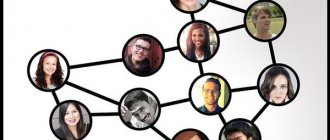- September 12, 2018
- Psychological terms
- Raisa Bogacheva
What do you call a person who doesn't like talking to people? These are introverts. They are withdrawn and closed, therefore, not inclined to communicate with other people, and it is very difficult for them to establish contacts with others. Such people almost always have thoughts that others negatively discuss their every action. In fact, it is very difficult to start a conversation based on this if the only thing in your head is how the interlocutor can criticize and evaluate you. More details about what people who don’t like to communicate are called later in the article.
Like really
Everything is, in fact, far from simple. Perhaps the introvert himself often evaluates and criticizes. The whole world is hostile to him and, based on this thought, nothing good can be expected from those around him. And when a person is engaged only in discussing, criticizing and evaluating other people, then over time he begins to think that all people do the same. This is the so-called projection illusion. It helps a person not to feel lonely, and thanks to it, introverts do not crave communication so much. These individuals seem to read minds; they firmly believe that they know what is in the heads of the people around them.
The sixth advantage of being an encyclopedist: you will learn to solve more complex problems.
Many of the biggest challenges facing society and individuals are being addressed through interdisciplinary capabilities.
Take obesity, for example. As the following chart shows, in the United States, four of the fifteen leading causes of death are related to obesity and diet. Millions of deaths are clearly preventable.
From the outside, it’s easy to argue that fixing the obesity crisis is easy. Just eat less and exercise. So? Not quite.
Below is a diagram from researcher Scott Page's book, The Diversity Bonus, which only partially shows how complex the obesity epidemic is. As you can see, solving this problem requires taking into account a variety of disciplines: physical education psychology, genetics, behavioral psychology, sociology, economics, marketing, general psychology, pedagogical system, dietetics.
How to understand this
For example, a person who does not like to communicate with people walks down the street and, stumbling, falls. As he stands up, he catches the glances of passers-by, and the first thought that is present in the introvert’s head, as a rule, is this: “Anyway, they now think that I’m an idiot.”
These individuals seem to take responsibility for the contents of other people’s heads, being confident and convinced that those who have negative thoughts that specifically affect the introvert. And the most important benefit of this illusion is that a person suffering from this illness thinks that if everyone criticizes and evaluates, this means that they are the same as the introvert himself. Thus, without realizing it, a closed person does not feel lonely.
Possible reasons
If a person loves cleanliness and order, then, at first glance, there is nothing bad in this, it is even good. However, when such a desire develops into a manic state, it can cause irritation among others, worsen relationships between partners, and even complicate the life of a person who is fixated on constantly putting things in order. Not everyone thinks that this state of affairs is dictated by some circumstances. In many situations, if you properly work through your problem, you can get rid of excessive pedantry and return to a normal lifestyle.
Let's look at what factors most often underlie excessive neatness, love of order and cleanliness.
- Perfectionist complex. Such individuals view putting things in order as a life challenge. Since this type of people wants to do everything 100%, the opportunity to clean their premises every day, while immediately seeing the results of their work, improves their mood.
- Clutterophobia, in other words, is the fear of disorder. This phobia may have genetic origins. Previously, people were forced to be clean to survive in a certain environment, when there were no disinfectants and antibiotics. Today, such fear can arise even for a minor reason. Individuals experiencing this phobia, when putting things in order, feel that they gain control over their own emotions and their lives, and calm themselves down in this way.
- The result of a negative attitude in the family circle. If a child grew up in a dysfunctional family, for example, one of the parents abused alcohol, there were serious financial shortcomings, the apartment was in chaos, it was very dirty, but the child managed to find at least some clean corner, he concentrated on it - this place was illusion of stability. Having matured, he strives for cleanliness in order to maintain his peace of mind.
- Need for approval. It is not surprising that purification rituals are given a lot of space in any world religion. Commitment to social norms, decency, and conscientiousness are characteristic of clean people. Neat individuals see themselves as responsible and conscientious. It is worth noting that, despite the fact that a neat person devotes a lot of time to cleaning, he drives himself into a trap. An overly ideal environment does not allow creativity. Creativity requires at least minimal chaos and disorder.
- Self-doubt, low self-esteem. A person resorts to putting things in order, putting things in their places, needing a sense of control over his life. Such behavior is typical of weak-willed and soft people. Especially if a person has difficult relationships with colleagues outside of his home, difficulties at work, and only at home, by putting things in order, he feels his worth, sees the results of his work, and improves his mood.
- The desire to grow in the eyes of a partner. Many women spend a lot of time cleaning because they want a man to appreciate such zeal for cleanliness.
- Trying to escape stress. If a person carries difficult experiences within himself, drives himself into a corner, then by immersing himself in cleaning, he temporarily forgets about negative thoughts and relaxes.
- Ripophobia is the fear of germs and dirt. A person cleans everything until it shines, because he is afraid of the risk of infection.
- The presence of mental illnesses: obsessive-compulsive disorder, neurosis, psychosis.
- The result of a ANS disorder.
Fear of evaluation
There are many types of fear: evaluations, consequences, loss of comfort, fear of not being recognized, fear of loss of significance and others. An introvert has everything, but most of all, of course, fear of evaluation. Each time, acting as fear wants, a person stews in it more and more, and each time in a similar situation, fear intensifies and a process begins that leads to isolation, closedness and hatred of the whole world.
Fear simply permeates the entire essence of such people, but they can fiercely deny it and throw anger at it. This illusion is a direct negation. For example, a mother asks her son: “Why did you stop communicating with people?”, and he told her: “They are all idiots, they are not interesting to me!” And it's not even cheating! If you combine anger with fear, then you end up with something similar to what was said.
Fearing the activities of the surrounding world, the introvert’s brain does not allow him to admit that he is afraid of any rustle, but putting a ton of anger on top of this fear is much more comfortable, and the tension will not be as hellish as when realizing that a person is simply afraid to talk to a stranger .
The era of modern encyclopedists
"The future belongs to integrators." — educator Ernest Boyer
I would define a modern encyclopedist as someone who has mastered at least three different subject areas and has been able to integrate them into the elite skill set possessed by the 1% of people.
In other words, they combine all the best achievements of humanity from different disciplines, which helps them cope more effectively with their chosen specialization. Below is the T-shape they fit into. Specialists, in turn, focus only on knowledge from their own subject area.
Since the concept was popularized in Malcolm Gladwell's book Geniuses and Outsiders, many now believe that to become a world-class specialist, you need to deliberately practice 10,000 hours of work to beat the competition, going as deep as possible. into the subject area. Modern encyclopedists directly contradict this popular advice by developing atypical interdisciplinary
combinations of skills and knowledge, and then integrating them and coming up with breakthrough ideas, moreover, they even invent completely new disciplines and industries where there
is almost no competition
.
For example, we have studied biology and sociology for hundreds of years. But no one studied them together or thought of combining them until the researcher E. O. Wilson became the first to study sociobiology in the 1970s. You can also think of modern tech heroes like Steve Jobs (whom I write about here), who became famous for their ability to combine design with hardware and software.
Elon Musk (whom I write about here) managed to combine the concepts of physics, engineering, programming, design, manufacturing and business, thus creating several multi-billion dollar companies operating in completely different industries. He has not only developed non-trivial combinations of skills, but also has an atypical combination of personality traits.
Charles Darwin, the creator of one of the most important theories in history - the theory of evolution - was also an encyclopedist. Stephen Johnson, author of Where Good Ideas Come From (one of my favorite five books of all time), brilliantly describes Darwin's first scientific breakthrough: “The idea was born out of cross-disciplinary thinking: to solve the mystery, Darwin had to think at once like a naturalist, an expert in marine biology and geologist. He needed to understand the life cycle of coral colonies, observe the tiny organic relief sculptures on the rocks of the Cocos Islands; to think about the colossal periods of time during which volcanoes have time to grow and then collapse into the sea... To understand this idea in all its complexity required a kind of probing mind, willing to cover such different disciplines and scales.”
A more life-like example involves my bosom friend Elizabeth Sanders. Elizabeth is passionate about creative writing, Christianity and time management - and has combined these interests to create a thriving coaching business based on Christian principles; She promotes her method in books and articles. There is a whole home business associated with time management, however, there are almost no religious resources on this topic.
To become a successful online writer, I deliberately combined academic research, digital journalism, and explosive growth techniques into a single bundle of skills. I didn't study any of this in college, but I constantly practiced and sought coaching on these topics. I've noticed that academics tend to look down on journalists, journalists tend to look down on marketers, and marketers tend to look down on journalists and academics. However, what many people don't realize is that each of these specialists can bring something valuable to the table, and that the combination of these skills can produce great ideas that appeal to a wide audience.
Fear of Rejection
Approach a girl and try, maybe, to get to know her? An introvert will not have such thoughts and subsequent actions. He clearly says to himself: “She will say no, no matter what.” And, it seems, what’s so difficult about taking it and approaching it. And even if there is a refusal, what bad will happen? The world will not collapse! But an introvert doesn't think so.
And he will explain everything to himself in any case, forcing him to make sure that it was the right action - it’s simply easier to move away than to risk approaching a girl, hearing “no,” aggravating his emotional state and adding a dose of tension. But it could have happened completely differently: a person would have approached, started getting to know each other, started a conversation, and everything would have been just fine. But fear prevents such actions from being performed.
Pansexuals
People with this type of sexual orientation can be attracted to absolutely all individuals of the human race. They don't care whether their partner is male, female, transgender, intersex or transgender.
For a pansexual, the personal qualities of a potential partner, the essence of the relationship with him and the emotions that they receive in the process of communication are more important.
They are able to fall in love with a person suffering from the last stage of obesity or serious developmental anomalies. Pansexuals do not pay attention to age differences; for them, a difference of 50 years may be acceptable. They build relationships on common hobbies and life goals, and this makes such unions strong and interesting.
Does an introvert really not like to communicate?
Wikipedia says that an introvert does not like communication, this is a false statement. Everyone loves to communicate, it’s just that a person who does not like to communicate with people has reached such a stage that he simply cannot admit his desire to make contact with others. He tells himself day after day about how bad everything is around him, and therefore he doesn’t seem to need communication, based on the fact that everyone is an idiot. Self-deception is what introverts do most of the time, denying and not accepting help from anyone. What for? Everything is fine with them, and, accordingly, they do not need assistance. There are many reasons why they reason and do the right thing, but at this stage they lack common sense.
Meaning of the word
The concept came to us from Ancient Greece. Back in 720 BC, the city of Sybaris (or Sybaris) was founded in southern Italy, in Lucania. The lifestyle of the sybarites determined the modern meaning of the word. The population lived in idleness and laziness. The favorable climate made it possible to harvest three crops per year. Trade routes passed through the city, and the Sybarites were famous for their grip in this area. They traded their own wine and also sought profit through cunning and deception. In the end, they became so lazy that they perceived any work as an unworthy pastime.
Is complete isolation necessary?
Common sense is a useful skill or trait in a person that makes it possible to correctly assess a situation and act correctly. Sitting closed from everyone, a person does not understand that he has a problem. He explained everything to himself in such colors that everything was just perfect, but if he took any actions that would bring him back into society, it would be just hell.
It is difficult to help a person who rejects that very help. Although there are still introverts who find the strength to look at themselves honestly and accept the help of a psychiatrist.
In complete isolation there is only degradation, and any introvert is heading there. Even if he locks himself in his apartment and reads (this can’t be called degradation), he has a high risk of mental changes, because it is impossible to develop without contact with society.
The process of losing common sense occurs slowly, but it is almost impossible to restore it. Over time, strange thoughts can materialize into actions that can cause irreparable damage to the introvert himself or even to those around him.
Bisexuals
These people are capable of being attracted to both men and women. They do not give preference to any one gender, and admit that they never know who will become the object of their passion.
It is wrong to assume that bisexuals have not decided on their orientation; they really, by nature, love both men and women equally.
Do not miss
- Do not miss
How I realized that I was bisexual: 3 real stories
What qualities does an introvert have?
There is a tree of character defects that is studied in institutes where psychology is taught. In the pillar itself is fear. And under the roots there are 3 significant aspects:
- hypersensitivity;
- idealism;
- perfectionism.
Most likely, in a person who does not like to communicate with people, it is hypersensitivity that predominates most of all. He thinks that everyone around him wants to offend him, hurt him, hurt him, but this has already been written about. And all this comes from life, when the process of becoming an introvert was just beginning.
All the insults they received were very hard for them to bear, and these feelings were simply beyond his control. And being in them for a long time makes a person embittered. Every text heard towards a person who is predisposed to become an introvert is processed by his brain, taken out of context, and fantasy comes into play. A person begins to think that they want to hurt and hurt him. And so every time! They may not even try to do this to him, but he becomes more and more offended and stops communicating. Such constant experiences encourage an introvert to move away from society in order to be alone with himself. There seems to be nothing wrong with just being alone. But this is not controlled. If today an introvert wants to be alone for 1 hour, then in a year he may not be able to stand an hour in society.
Closedness and withdrawal can also manifest themselves not only because of something far-fetched, but also because of negative experiences gained in the past. For example, when wanting to get acquainted, an introvert heard not only a refusal, but also something bad that could, accordingly, hurt him greatly.
What you call a person who doesn’t like to communicate is no longer a secret. And it is very important not to allow real or imagined grievances to guide our actions.
Sybarite lifestyle
In carelessness the good one lives like a sybarite (A. S. Griboedov)
Luxury and laziness
They lived in luxury. In Sybaris, for the first time, society was divided into two parts, not only according to material principles, but also according to areas of residence. Rich sybarites evicted all artisans and other working people to the outskirts of the city. The workers got up early and got to work. This prevented the sybarites, who led a nocturnal, riotous lifestyle, from sleeping until lunch. For the same reason, there were no roosters in rich areas. At the same time, the rest of the population of Sybaris was by no means in poverty. Both ordinary people and slaves made good money from the lazy rich.
Idleness and gluttony
The Sybarites, they say, sent out invitations to their women a year in advance, so that they would have time to dress up for the feast (Plutarch)
The life of the sybarites was spent in idleness. Society was judged by clothing, the decoration of houses and the luxury of feasts. Legends were made about the gluttony of sybarites in the ancient Greek world.
The chefs tried to outdo each other in the sophistication of their dishes. The tables were laden with food. The sybarite's menu included seafood, including giant oysters, crabs, lobsters, and a variety of shellfish. They prepared for each feast for several weeks, carefully thinking through clothing, hairstyle and decorations. Cooks and fabric dyers made fabulous money from this.
We learned a lot about the life of the Sybarites from the works of Herodotus, who himself was a citizen of Sybaris and died there in 425 BC. We can judge the morals and psychological portrait of the sybarite from Herodotus’ description of the matchmaking of the local rich man Smindirids. He fell in love with the daughter of the ruler of the polis Sikyon, Cleisthenes, and went to woo her, accompanied by thousands of bird catchers, fishermen and cooks. While boasting about the skills of his slaves, he once again emphasized his inadequacy as a complete incompetent. Legend has it that the girl decided to give her hand to any of the workers, but not to the lazy Smindirid.
Destruction of the city of Sybaris
Sybarite even rolls into the abyss with comfort (Valentina Bednova)
Next to Sybaris there was another ancient Greek city, Croton. The neighbors were complete opposites and quietly despised each other. The hardworking and ascetic Crotonians, who accepted the teachings of Pythagoras, were irritated by the ever-merry and idle sybarites. They considered their neighbors to be the source of evil and rightly believed that this evil should be destroyed. Chance brought them to the battlefield.
This happened in 510 BC. Five hundred inhabitants of Sybaris sought refuge in Croton. Apparently, not everyone liked the order of the tyrant Telius, established in the “city of dreams.” The rulers of Croton agreed to accept the fugitives and sent a delegation to their neighbors to give explanations. The Sybarites did not listen to the ambassadors, but simply executed them. This was unheard of blasphemy. The Pythagoreans gathered an army and marched against the hated sissies under the leadership of the Olympic champion Milo.
Judging by the chronicles, this was not a battle, but a reality show for the amusement of the audience. As the sybarite cavalry approached, the Crotonian musicians began to play flutes. Horses trained to dance began to beat the step with their hooves, and the discouraged sybarites fell dead from the arrows and swords of their opponents.
In order to completely forget about the riotous past of its neighbors, after the victory, Sybaris, like Sodom and Gomorrah, was flooded by the waters of the Kratis River. The winners specially brought the riverbed to the plundered city and buried it under a layer of river silt. The remaining sybarites scattered along the coast and found shelter in other policies. Three times they tried to revive Sybaris, but without success.
Demisexuals
This type most often includes women. Demisexuals do not experience sexual attraction to a person until they have formed a spiritual attachment towards him.
An example from life: a man and a woman had been friends since school, continued to communicate in adulthood, without having any romantic relationship. None of them had a good personal life, and after 30 years they suddenly realized that they were sexually attracted only to that same “desk neighbor.”
In the situation described, deep emotional intimacy and attachment was formed and became the basis for sexual attraction.
Desperate pedestrians
Lifehacker dedicated a separate article to auto-hammers. But there are also complaints about other road users. They also often create dangerous situations.
They cross the road right in front of the car
For pedestrians, the Russian Federation Traffic Regulations are provided, 4. Responsibilities of pedestrians: There are many ways to safely cross the road. Running out onto the roadway in front of a car is not one of them. Wedging into traffic 50 meters from a traffic light is the same. This endangers not only the life and health of the offender. Firstly, the driver can suddenly brake to save the life of a pedestrian, which will lead to an accident involving several cars. Secondly, the car may not have time to stop. And even if the driver is found not guilty, a fatal accident is a very traumatic experience.
Walking along the side of the road at night without reflective elements
A car is a source of increased danger, and therefore the driver must be careful. But supernatural vision is not given along with a license, so irresponsible walks can end sadly.
Abuse the power given to them by traffic rules
A car must allow a person to cross a zebra crossing at an unregulated crossing. But this does not mean that he should slow down to a minimum and cross the road at a snail’s pace. Mutual respect is the key to good relations on the road.
Moving along a strange trajectory
Let's move from the road to the sidewalk. A good pedestrian is a predictable pedestrian. Anyone who constantly rushes from side to side and suddenly stops creates a lot of problems for others.
An interesting person is a successful person
An interesting person is determined not only by his behavior, ability to communicate, energy, but also by the results of his activities. If he is successful, he will always be popular and interesting to society.
You need to try to achieve success in your field in order to become an example for other people. Masters and professionals never go unnoticed.











